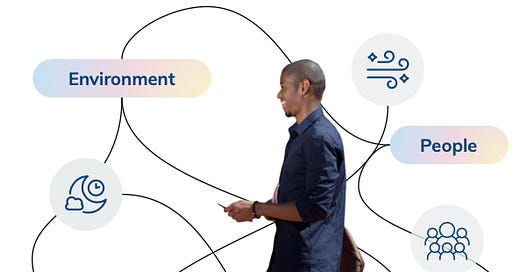During the depths of the COVID-19 pandemic, I built and led a new research and development unit within BARDA, the U.S. agency responsible for funding vaccines, diagnostics, and medicines for public health emergencies. BARDA (the Biomedical Advanced Research and Development Authority) was supporting, among many other efforts, the commercialization of the world’s first mRNA vaccine. The unit I led, DRIVe, was created to take a longer view, one beyond the current COVID-19 health emergency, to fund a range of science and technology technologies that had the potential to fundamentally transform our ability to respond to future health emergencies.
As part of that work, I spoke with nearly a thousand health-related startups from all over the world. These were early stage companies with cutting edge technologies and a grit and determination to make a difference. I can tell you from those conversations: I’m incredibly optimistic by what’s on the horizon, not just for infectious disease but across all medicine and public health.
But two problems kept rising to the surface. First, the majority of these companies (and the world-class talent behind them) were designed to react to disease rather than prevent it. Second, too many of these companies draw on traditional business models that both hinder innovation and create vulnerabilities for market sustainability. I began to see a troubling pattern - we’re not building the kinds of companies we need to safeguard, much less promote, our collective wellbeing.
A Health Crisis Deepening
In short, our public health infrastructure is just not designed to meet the problems at hand. And these are really big problems. Obesity rates are higher than ever, with 40% of U.S. adults now obese. We are living in a loneliness epidemic, with a consequent increased risk of heart disease (29%), stroke (32%), and dementia (50%). Diseases of despair like drug overdose, suicide, and alcoholic liver disease have increased. Collectively, this has contributed to a decline in life expectancy in the US over the past several years.
And things don’t get better for our children and youth. The mental health crisis among teens and young adults is also escalating, with 4 in 10 reporting persistent feelings of hopelessness and sadness, 1 in 3 seriously considering suicide, and 42% saying smartphone use impairs their social skills. Childhood and adolescent obesity have reached epidemic levels in the United States. Currently, about 17% of US children are presenting with obesity.
At the same time, the probability and severity of epidemics and engineered biothreats are increasing, posing growing health security threats. Many of these problems are global, with climate change and industrial activity increasingly driving a deteriorating environment for health.
Rethinking Health as Humanity
These are problems that medical care is neither designed to solve nor capable of solving. Yet our current systems—healthcare, public health, and global health—are all oriented towards clinical care and away from the bigger picture. Healthcare is reactive and designed to treat illness; US public health is resistant to innovation and profit-driven companies; global health is slow, mired in bureaucracy, and is not doing nearly enough to encourage regional innovation.
This is why we are introducing a new framework, Humanity Health, that recognizes the complex interplay among people, environments, norms, and industries that influence our health - what we eat, how we sleep, what we breathe, how we find purpose, how we connect with one another, and how we consume information. We believe that to solve the public health crisis, we must deploy innovation from multiple vectors to maximize impact and long-term success.
To make meaningful change, we seek to create companies with innovative business models to tackle these challenges head-on. We can no longer rely on the regulated healthcare economy as a crutch. Entrepreneurs and experts in health must be empowered to build real companies that create scalable solutions, towards a collective goal of repositioning our industries and our economy with health as a core principle.
Crucially, Humanity Health is not just the sum of individual health. It is an emergent property—a collective state we can measure, optimize, and use to build resilience against pandemics and chronic diseases alike.
Building a new Phenotype of Company
The mission of Humanity Health is to build companies that make the world a healthier place to live. To achieve this, we need to launch dozens of for-profit companies across multiple industries. Commercial enterprises have the unique ability to reinvest profits into scale. They can attract world-class talent. They can maintain high degrees of organizational efficacy. While corporations are designed to maximize shareholder value, when designed by the right set of founders to solve problems that matter, they can be transformative.
We need companies that will modernize our failed public health communications. Companies that create efficiencies in how science and health are funded. Companies that build direct-to-consumer channels for public health products. Companies that develop field diagnostics for wildlife and agriculture that can anticipate when pathogens will spillover from animals to humans. Companies that empower citizens to monitor their own backyard for environmental toxins. Companies that improve indoor air quality, and tackle countless other challenges. But for these companies to succeed, they need to also develop new business models to fuel the growth needed for impact.
This is how we will build the new agents of change in the 21st century - not by sitting on the sidelines, but with entrepreneurs and experts in health leading the charge to rethink our approach to collective wellbeing. The time has come to move past outdated systems and rebuild an economy centered on Humanity Health.
Acknowledgements: Thanks to Nour Sharara, Thomas Goetz, David Bowen, Alex Dehgan, and Wendy Sue Swanson for their thought leadership and collaboration on this post.




Holy Ambition Batman. Wishing you all the best.
I applaud this idea!
We need to discuss it. I have been working on a startup for five years that is based on the idea that the public sector operates under different rules than other market sectors in our society.